Authors — Nicholas Rombes
-
The Blue Velvet Project: Confession Redux
May 28 The Blue Velvet Project will resume with post #119 on May 30th. In the meantime, this is a re-post of the April 23 confession, with a new confessional update at the bottom of the post. ————————- As author of The Blue Velvet Project—which owes a moral debt to the Dogme 95 movement, whose practice of constraint was an inspiration—I feel obligated to make this public statement of confessions regarding the rigors of the project. This is done in the spirit of Thomas Vinterberg’s confession regarding his film The Celebration. Despite the fact that I promised Mr. Macaulay, Filmmaker […]
by Nicholas Rombes on May 28, 2012 -
The Blue Velvet Project, #118
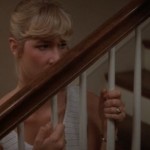
Second #5546, 92:26 1. Seconds after this shot, Sandy’s father, Detective Williams, will ask Jeffrey: “Is Sandy part of this?” It’s more along the lines of a warning than a question. Sandy, in the diagonally split screen, longs so deeply not just for Jeffrey but for the knowledge/power suggested by the office of her father. 2. Truth is a thing of this world: it is produced only by virtue of multiple forms of constraint. And it induces regular effects of power. Each society has its regime of truth, its “general politics” of truth: that is, the types of discourse which […]
by Nicholas Rombes on May 25, 2012 -
The Blue Velvet Project, #117
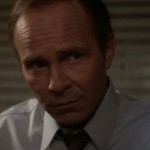
Second #5499, 91:39 This look—this sharp, suspicious, and accusatory look—is passed between Detective Williams and Jeffrey just moments after Jeffrey describes Frank as “a sick and dangerous man.” In the temporal flow of the film, the moment of this gaze passes very quickly, as the narrative draws our attention to what Jeffrey (who has brought along his black and white surveillance photographs) tells Detective Williams about Frank and his dark goings-on. And yet, when the film is frozen and this frame from second #5499 is de-linked from linear chronology, the Detective’s look takes on a new shade of meaning, one […]
by Nicholas Rombes on May 23, 2012 -
The Blue Velvet Project, #116
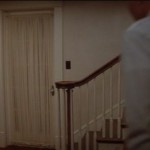
Second #5452, 90:52 In Camera Lucida: Reflections on Photography, Roland Barthes wrote about the studium (the cultural and political meanings of a photograph) and the punctum (the piercing of the photograph into the realm of personal meaning): Now, confronting millions of photographs . . . I sense no blind field: everything which happens within the frame dies absolutely once this frame is passed beyond. When we define the Photograph as a motionless image, this does not mean only that the figures it represents do not move; it means they do not emerge, do not leave: they are anesthetized and fastened […]
by Nicholas Rombes on May 21, 2012 -
The Blue Velvet Project, #115
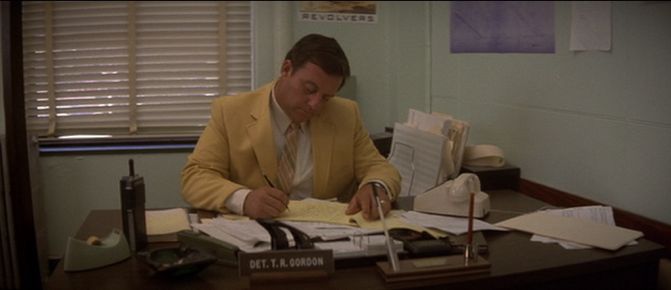
Second #5405, 90:05 Detective Gordon (aka The Yellow Man, or The Man in Yellow, played by Fred Pickler) sits at his desk at police headquarters, where Jeffrey has gone to see Detective Williams. He spots Gordon in his office and, startled that this is the same man he’d seen earlier with Frank, takes a moment at a drinking fountain across from Gordon’s office to get a better look, which constitutes this shot. Gordon is a terrifying presence for reasons that are impossible to sort out. The fact is he shouldn’t be terrifying, sitting there in his yellow (yellow!) jacket, working […]
by Nicholas Rombes on May 18, 2012 -
The Blue Velvet Project, #114
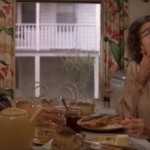
Second #5358, 89:18 When Blue Velvet is funny, it is very funny. This shot opens with Jeffrey’s mother and his Aunt Barbara (the late, great, Frances Bay) looking up from the breakfast table at something, aghast. However, in a sharp instance of delayed decoding, we don’t see what they see for several seconds. For all we know, they could be looking in frozen horror at an intruder, or a monster (perhaps the entity behind the Winkie’s dumpster from Mulholland Drive), or something visible only to them. It is only at this moment that we see what they see: Jeffrey, whose […]
by Nicholas Rombes on May 16, 2012 -
The Blue Velvet Project, #113
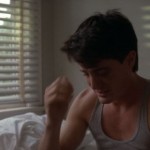
Second #5311, 88:31 1. This frame is from around twelve seconds into a thirteen-second shot, just before the screen goes black. Jeffrey sobs. The unflinching, unmoving camera eye does not look away. There is no soundtrack. There is nothing ironic or postmodern about this moment. 2. Paul Virilio, from his book Open Sky: ‘If anyone thinks I paint too fast, they are watching me too fast,’ Van Gogh wrote. Already, the classic photograph is no more than a freeze frame. With the decline in volumes and in the expanse of landscapes, reality becomes sequential and cinematic unfolding finally gets the […]
by Nicholas Rombes on May 14, 2012 -
The Blue Velvet Project, #112
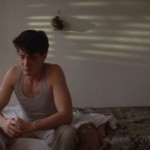
Second #5264, 87:44 This shot comes at the beginning of a montage that unfolds in this sequence: 1. Jeffrey on bed, from which the frame at second #5264 is taken: 11 seconds 2. flashback to Dorothy’s face, close-up, “hit me”: 2 seconds 3. back to Jeffrey on bed: 8 seconds 4. flashback to Jeffrey hitting Dorothy: 2 seconds 5. back to Jeffrey on bed, crying, camera dollying in: 8 seconds 6. implied flashback; close-up of Donny’s helicopter hat: 2 seconds 7. back to Jeffrey on bed, crying: 4 seconds 8. flashback to bedroom door in Ben’s apartment where Donny is […]
by Nicholas Rombes on May 9, 2012 -
The Blue Velvet Project, #111

Second 5217, 86:57 I wondered when, or if, this would happen: a Blue Velvet frame that depicts nothing. This comes from the time-space between the beating that leaves Jeffrey unconscious and waking up the next morning in the dirt. For around six seconds between these scenes, the screen is filled with a close-up of a candle flame holding its own against a roar of wind, only to be extinguished, followed by a black screen, from which this frame is taken. Jeffrey’s mind going black. Blank. The black screen, haunted with psychopaths and monsters. Of all of Blue Velvet’s uncharted associations, […]
by Nicholas Rombes on May 7, 2012 -
The Blue Velvet Project, #110
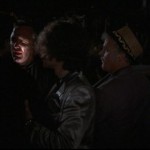
Second #5170, 86:12 In the spirit of the humor of the scene from which this frame is taken (and because it’s Friday) this is a post of a different stripe. Part of what constitutes Blue Velvet’s weird chemistry is its humor, the humor that lies at the end of despair and that arises out of a confrontation with the absurdity of evil. Frank is terrifying in this scene—having just wiped some lipstick from Jeffrey’s face with that talismanic swatch of blue velvet—but also oddly funny. He is a monster, but also pathetic, and the aura of theatrical performance he has […]
by Nicholas Rombes on May 4, 2012
